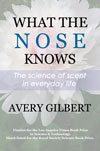
Acquired motor skills enlarge the brain areas that control them. For example, the motor regions that activate fine movements of the left hand are larger than average in violinists. But what about olfactory expertise? Do professional perfumers have more brain tissue devoted to smelling? A French research team believes the answer is yes.
Led by Chantal Delon-Martin, the team examined MRI scans taken during an earlier study of brain activity during olfactory mental imagery. The brains in question belonged to 14 professional perfumers, 13 perfumery trainees at ISIPCA, and 21 untrained folks (some young, some old) who served as controls.
Using the latest statistical and data processing techniques, Delon-Martin and colleagues found that perfumers and trainees have more gray matter in areas associated with odor perception, namely the gyrus rectus and the medial orbital gyrus (GR/MOG). (For all you neuroanatomy fans, the GR/MOG borders the olfactory sulcus and lies next to the putative secondary olfactory cortex. It is thought to be involved in higher-order cognitive processing of odors.) So it seems that exercising your sense of smell—at the intense professional level, at least—enlarges the relevant portions of your brain.
While it has been known for some time that loss of odor perception is associated with reduced olfactory processing areas in the brain, these new results are the first to appear on the positive side of the ledger.
The researchers also discovered that smelling for a living counteracts the age-related shrinkage normally seen in the GR/MOG brain areas. This is a neat instance of the “use it or lose it” phenomenon and helps explain why age doesn’t seem to slow down many perfumers.
The study discussed here is “Perfumers’ expertise induces structural reorganization in olfactory brain regions,” by Chantal Delon-Martin, Jane Plailly, Pierre Fonlupt, Alexandra Veyrac, and Jean-Pierre Royet, published in Neuroimage, 68:55-62, 2012.




No comments:
Post a Comment